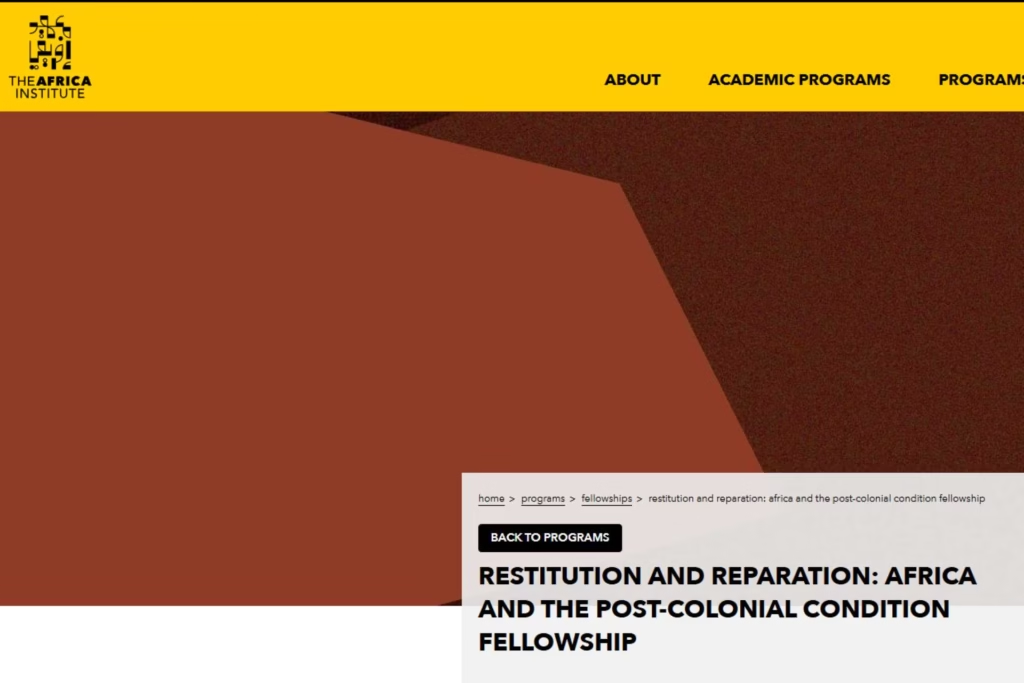The Africa Institute has launched the Restitution and Reparation: Africa and the Post-Colonial Condition Fellowship to advance scholarship and public discourse around the restitution and repatriation of African art, artefacts, and cultural heritage. This initiative provides an academic platform for in-depth research, while also fostering dialogue between Africa, the diaspora, and global institutions. Fellows are encouraged to engage critically with histories of colonial dispossession and explore pathways for restorative justice.
This fellowship forms part of a larger Open Society–supported project that combines academic research with public engagement. Beyond the residency, the program includes a lecture series, a scholarly conference, and a final publication. Selected fellows will contribute to these components, ensuring their work not only advances their own research but also feeds into broader debates shaping the future of cultural heritage and restitution efforts worldwide.
Fellowship Summary: At a Glance
- Fellowship Name: Restitution and Reparation: Africa and the Post-Colonial Condition Fellowship
- Organising Institution: The Africa Institute
- Location: Sharjah, United Arab Emirates (UAE)
- Residency Period: Spring 2026 (One semester)
- Application Deadline: October 1, 2025
- Contact/Application Email: applications@theafricainstitute.org
Benefits
- Residency: Fully funded one-semester residency at The Africa Institute in Sharjah, UAE.
- Research: Dedicated time and institutional support for research on restitution, repatriation, and African heritage.
- Networking: Collaboration with an international community of leading academics and practitioners.
- Platform: Opportunity to present work through The Africa Institute’s lecture series.
- Publication: Inclusion in a collective publication and guidance for future academic or public dissemination.
- Community: Entry into a professional network committed to restitution and cultural justice.
TWAS-SN Bose Postdoctoral Fellowship Programme 2025/2026
Eligibility Criteria
- Education: Applicants must hold at least a Master’s degree, with preference for those holding a Ph.D. or equivalent expertise in relevant fields.
- Research Relevance: Proposals should directly address restitution, reparations, or the circulation of African cultural heritage, and align with the fellowship’s wider project framework.
- Engagement: Fellows must commit to presenting during the lecture series, participating in the final conference, and contributing to the published proceedings.
Application Process
Applicants should combine all required materials into a single PDF and submit via email.
Required Documents (in order):
- Research Proposal/Letter of Interest (1,500–2,000 words) including:
- Abstract for a publishable paper
- Project goals and research questions
- Methodology
- Expected outcomes
- Contribution to wider restitution and reparations discourse
- Curriculum Vitae (CV)
- Two Writing Samples (articles, book chapters, or similar)
- Two Reference Letters from experts in related fields
Submission Guidelines:
- File Name Format: Open Society_LASTNAME_FIRSTNAME.pdf
- Email Subject Line: Same as file name (e.g., Open Society_SMITH_JANE)
- Email Body: Indicate clearly that you are applying for the Spring 2026 semester
- Send to: applications@theafricainstitute.org
Key Information
- Deadline: October 1, 2025
- Residency Period: Spring 2026 semester
More information is available on the official fellowship webpage.
Discover more from Leaving Nigeria
Subscribe to get the latest posts sent to your email.





